

I don’t think I would have got into dance without my disability
Rebecca Fowler



I don’t think I would have got into dance without my disability
Rebecca Fowler

At TGA, we believe that when it’s hard to move, you needn’t stop living. We provide scooters and wheelchairs tailored to suit all kinds of people with all kinds of needs. Which is why we are supporting MS-UK so that MS Pathway readers can receive a 10% discount on mobility scooters, powerchairs and wheelchairs. As an extra thank you, we will make a donation to MS-UK for every product purchased.
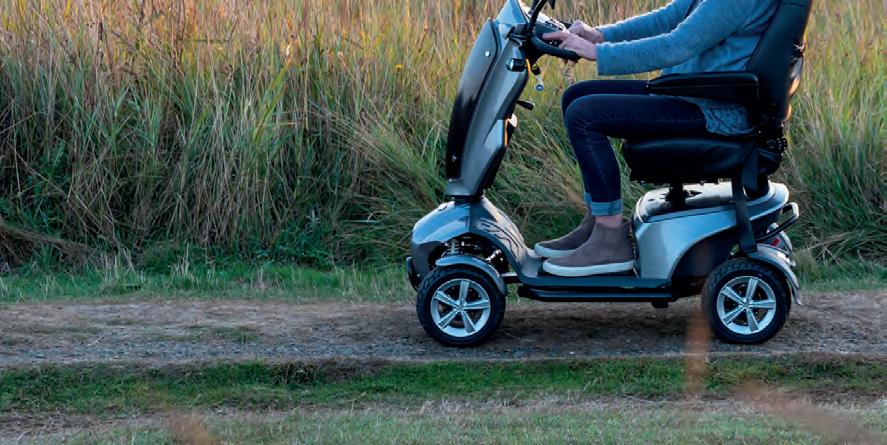
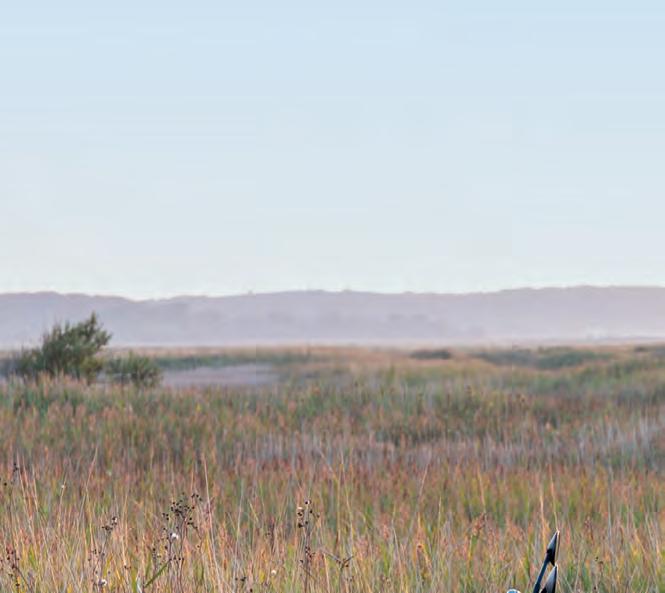
To ensure you find the ideal product, TGA offers a free home demonstration appointment with a qualified regional advisor so you can try our products with no pressure or obligation in the comfort of your own home and surroundings – making sure you get the right product for you.
QUOTE: MSUK2023
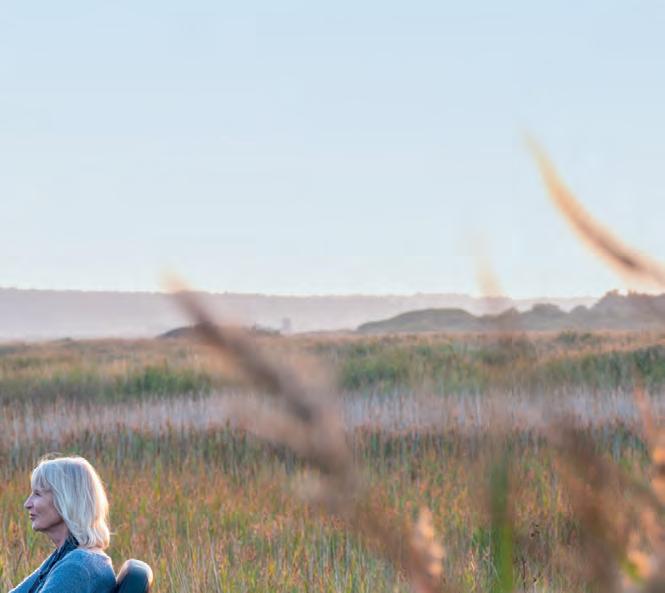
believe her. We also hear how joining our online peer pods has helped enrich the lives of two MSers on page 32, plus we have all of your usual favourites and the latest news and research to keep you up to date.

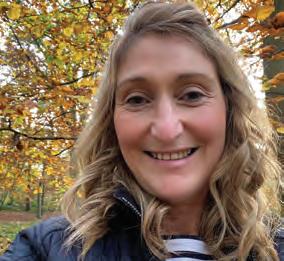
ADVERTISING SALES Lee Morris
Call 0203 9000 102

Email ms-uk@syonmedia.com
ART EDITOR & DESIGNER Ami Williams

All images are used for illustrative purposes only.
Registered Company Name
Multiple Sclerosis-UK Limited, trading as MS-UK
Company Number 2842023
Registered Charity Number 1033731
VAT Number 632 2812 64
Registered Office: D3 Knowledge Gateway, Nesfield Road, Colchester, Essex, CO4 3ZL
All rights reserved. No part of New Pathways may be reproduced or restored in a retrieval system or transmitted in any way without prior permission of the Editor.
New Pathways and its publishers do not guarantee accuracy of statements made by contributors or advertisers, or accept responsibility for any statement which they express in this publication. Articles are considered on the basis that they are the author’s original work.
www.ms-uk.org

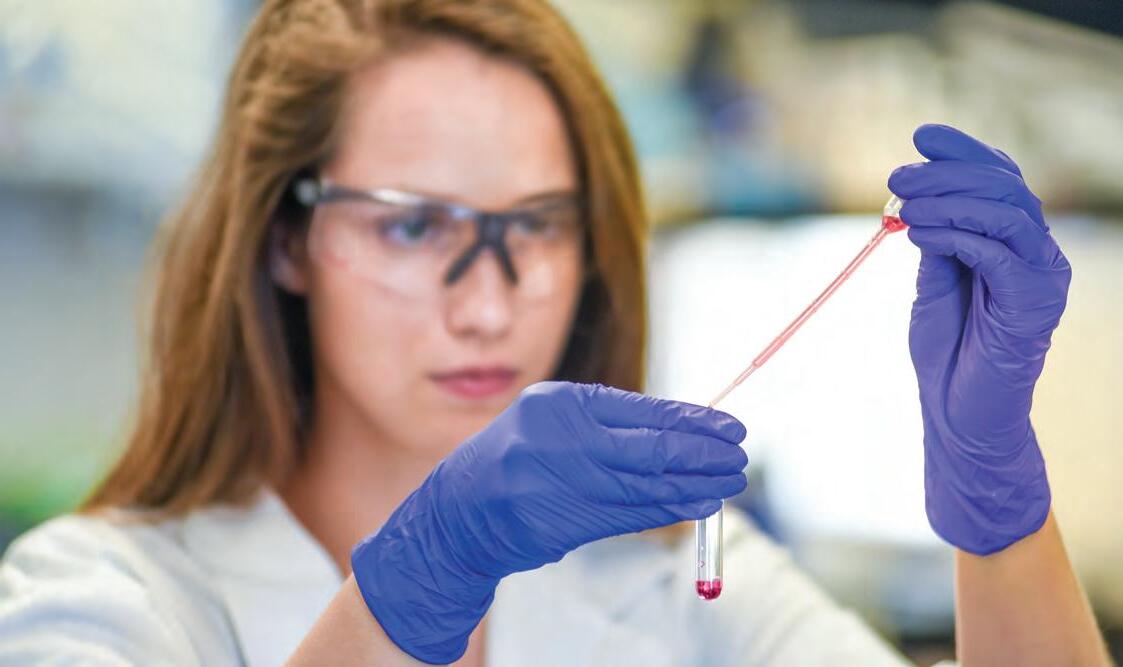
A study on 22 people with multiple sclerosis (MS) found that they had no new disease activity for at least two years after they had autologous haematopoietic stem cell transplant (aHSCT) at a facility in Mexico.
Roughly two-thirds of the patients were male. Five had
primary progressive MS (PPMS), six had relapsing remitting MS (RRMS) and half had secondary progressive MS (SPMS).
The most recent follow-up of the patients, which was on average seven years porttreatment, found that over two-thirds were still free of MS activity. The results were presented at the American Academy of Neurology (AAN) 2023 Annual Meeting which took place in Boston, US, and virtually.
Over two-thirds of participants were still free of MS activity at the seven-year follow-up
AHSCT sees a patient’s stem cells harvested from the bone marrow, and them then undergoing chemotherapy to wipe out the immune system. The stem cells are then returned to the patient, with the aim of ‘regrowing’ an immune system that’s healthy and does not unleash inflammatory attacks on the brain and spinal cord.
It requires a hospital stay of several weeks and is available in the UK on the NHS but usually only for those people who fit a certain criteria.
The procedure is not without risks and seven participants had significant safety issues connected to the aHSCT, which included fever and severe infections.
During the period until the long-term follow-up, several patients had developed other health issues, but it was not specified whether there was a connection between these problems and the aHSCT treatment.
“This observational study shows that aHSCT using a low-intensity regimen is relatively safe when done in highly experienced centres, with good long-term outcomes in RRMS and SPMS patients,” the scientists said. “Given the lack of current treatment option for SPMS, aHSCT may be a viable option for mitigating disease progression when other options are not available.”
Scientists may have uncovered one of the mechanisms behind the protective effects pregnancy may have on MS patients.
Women in the study who had children had various differences in methylation, which is a type of DNA modification, compared with those who had not ever been pregnant.
Some research on pregnancy and MS indicates that it is protective in the long term for women to have children. Some studies have found that it may delay the onset and progression of the condition.
Women are most commonly diagnosed at a reproductive age, usually between the ages of 20 and 40, so understanding the influence of pregnancy on MS is important in providing patient care.
The researchers said many of the genes affected by the methylation were to do with nerve cell development and function. “Based on these findings, we believe that pregnancy-induced differences in DNA methylation could underlie the long-term protective effect of pregnancy in women with MS,” said Pia Campagna, one of the study’s authors.

Supplementing phosphoenolpyruvate (PEP) in a mouse model of MS eased symptoms of the disease in a new study. The molecule PEP is



produced in the body during cellular energy generation. It blocked the production of pro-inflammatory interleukin-17 (IL-17) by inhibiting a protein called JunB, which also
suppressed the growth of immune cells called Th17, cells in the immune system that promote auto-immune tissue damage.

The mice in the study were injected daily with high doses of PEP, which, consistent with what it was found to do in laboratory cells, decreased production the production of IL-17 in the lymph nodes and spleens of the animals and suppressed Th17 cell generation.
The MS-like symptoms experienced by the mice were reduced, which the researchers said suggested meant PEP had “therapeutic potential for Th17-mediated autoimmune disorders”, and that “An approach utilising PEP or its derivatives to modulate JunB function may have potential for selective therapy of autoimmunity.”

They added that because such a high dose of PEP was needed, they would also need to look at increasing the efficiency of the molecule.

Supplementing an energy metabolite has potential to treat MS
A new online cannabis clinic has opened in the UK to treat people with MS and other chronic pain conditions.

Opened by the Kanabo Group and powered by GP Service, an online platform where patients can pay to see a GP virtually, the clinic is called Treat It (treat-it.clinic). Its aim is to offer a solution to people for whom other pharmaceutical drugs have proved ineffective, or who are frustrated by the long wait times for referrals.
The clinic can access patients’ medical records and offer access to an appropriate physician, usually within 24 hours, and provide medical cannabis.
Once a prescription is processed, delivery of medical cannabis to a partner pharmacy is typically made within a week, with repeat prescriptions arriving usually the next day.
Closely following a Mediterranean diet may help reduce cognitive problems in people with MS, a study has found.

The Mediterranean diet avoids or includes a very low amount of unhealthy saturated fat, dairy products, processed sugar and red meat. It focuses on a high consumption of vegetables and fruit, fish, and healthy fats such as olive oil.
The study was on 563 people with MS. Of these, 108 (19 per cent) had cognitive impairment. Patients who followed the Mediterranean diet closely had a 20 per cent lower risk of cognitive impairment than those who didn’t eat the diet.
Of the patients whose diets least
A new study has found that sleep disorders such as sleep apnea and insomnia may contribute to cognitive decline in females with MS.
The study took data from over
resembled the Mediterranean diet, 34 per cent had cognitive impairment, compared with 13 per cent of people whose diets most closely adhered.
This association between diet and cognitive impairment was stronger in patients with progressive MS, rather than relapsing-remitting.
The study’s authors said the results were the same when adjusting factors potentially impacting cognitive function, too.
63,000 nurses – 524 of whom had MS – and found that in patients who had sleep disorders tended to self-report worse cognition four years later. Cognition problems included difficulty following conversations or instructions.
Those with MS had a higher prevalence of common MS sleep disorders such as obstructive sleep apnea, excessive daytime sleepiness, and insomnia.
“Perceived cognitive decline, even in the absence of objective changes, could be an important window of opportunity to identify treatable exacerbating factors, such as sleep disorders,” Dr Tiffany Braley, lead author of the study said.

Infection with Covid-19 accelerates neurological disability in MS patients in the first few months frominfection, a new study reports.
Researchers in Belgium found that more severe cases of the infection were associated with faster worsening of symptoms of MS. Being vaccinated against Covid-19 offered protection against more severe infection, but it didn’t affect a quicker disability accumulation.
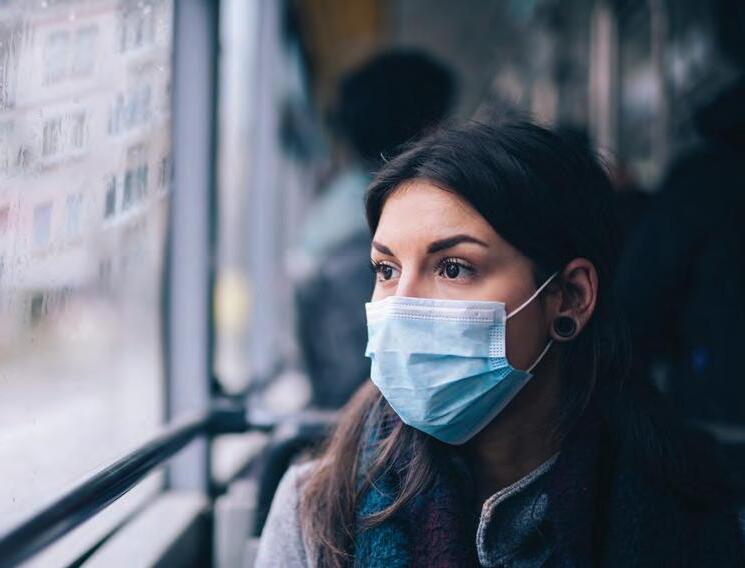
Experts know that infections in general can exacerbate MS symptoms and increase lesions on MRI scans. Some studies have also found neurological symptoms worsen after hospitalisation due to any cause. Other studies have focused on

risk of severe infection with Covid-19 and immune responses to vaccination. Few have looked at how Covid-19 affects MS progression.
This study found disease worsening was seen particularly in those with progressive MS, and in those who were hospitalised with the infection. “Mathematically expressed, a more aggressive course of COVID-19 resulted in a more than 2.5-fold increase of the risk of subsequent clinically relevant
EDSS deterioration,” they wrote.
The exact mechanisms involved to exacerbate MS symptoms by Covid-19 remain unknown, but the researchers said that because the infection can trigger neurological symptoms, this indicates the virus affects the nervous system.
Covid-19 is also associated with temporary loss of brain myelin and spinal cord, which MS patients may have more difficulty in repairing.
A single gut bacteria may be responsible for triggering MS and driving its ongoing activity, according to a new study.
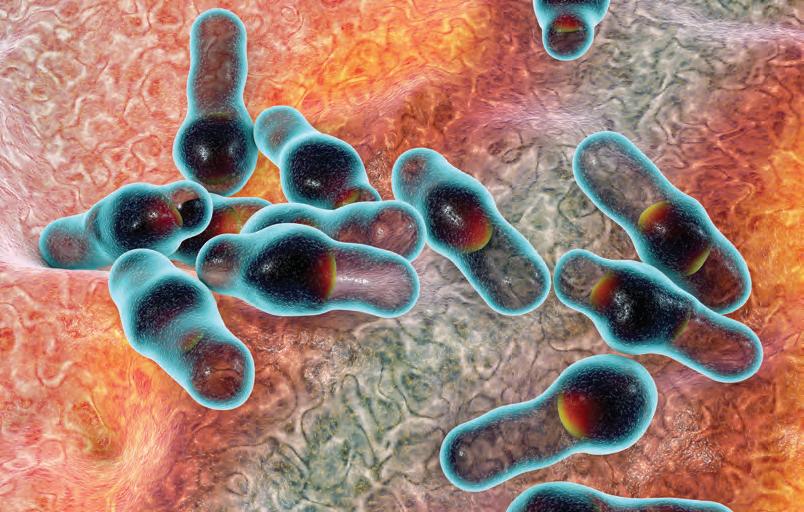
Scientists identified the bacteria Clostridum perfringens in very high amounts amongst the gut bacteria of people with
MS. The bacteria produce epsilon toxin, which plays a role in the pathology of MS.
In a preclinical disease model, epsilon toxin allows inflammatory cells into the central nervous system by opening the brain’s blood vessels, causing demyelination.
German startup company
EBViously has announced it plans to bring a vaccine for the Epstein-Barr virus (EBV) into clinical trials next year.
EBV is a known risk factor in the development of MS and so the development of a vaccine against this virus, which affects up to 95 per cent of the population, could have big implications for the future of the condition.
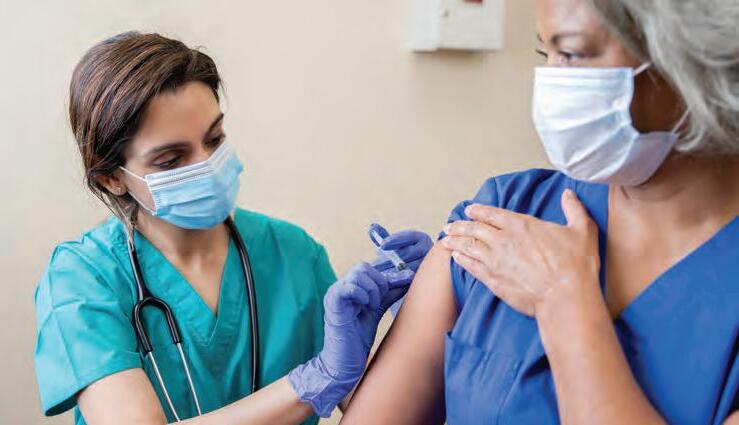
One study that looked at more than 10 million adults in the US over the course of 20 years
found that previous infection with EBV increased the risk of developing MS by 32 times. Researchers have speculated the reason for this is because there are similarities in the proteins in the virus to proteins in the brain, and so the body’s own
There has been mounting evidence this bacteria’s toxins may be relevant to MS, but recent studies have failed to it amongst the microbiome. This study used highly sensitive DNA detection techniques and found that MS patients are more likely to have the toxin-producing C perfringens in their small intestines than healthy people.
It is known that in genetically susceptible people, an environmental toxin is required to trigger MS onset. C perfringens lives in the small intestine but only produces epsilon toxins for a short time during the growth phase, which fits the relapsingremitting pattern of MS.
The researchers hypothesised that “A treatment that neutralises epsilon toxin may halt our patients’ new disease activity.”
immune response to the virus may also attack the brain.
The potential vaccine, EBV001, contains particles similar to the virus but that cannot cause infection – they are composed of virus shell but have no viral genetic material.
The benefits of the drug
Mavenclad (cladribine) in people with MS continued for up to 15 years after patients stopped the treatment, in real-world data from the CLASSIC-MS study.
Over half of participants in the clinical trial who received the oral therapy no longer needed more disease-modifying therapies (DMTs) and twice as many continued to be relapse-free after a median average of 10.9 years, compared with people
who didn’t take the drug. Mavenclad works by reducing the number of immune cells in the bloodstream that are causing nerve damage and inflammation in MS.
The study also found that more people treated with Mavenclad weren’t using a wheelchair or were not confined to bed when
compared to those who took a placebo – 90 per cent vs 77.8 per cent.
The trial met another long-term disability goal by demonstrating people who took Mavenclad were more likely to not need walking assistance than those who took a placebo – 81.2 per cent vs 75.6 per cent.
symptom-free periods, followed by relapses. Some of these people progress to SPMS, where their MS symptoms worsen independent of relapses.
Around one in ten people with MS will have PPMS, in which the worsening happens from disease onset, whether they have relapses or not.
The findings are consistent with the differences in age at onset and progression rates for both groups of patients.
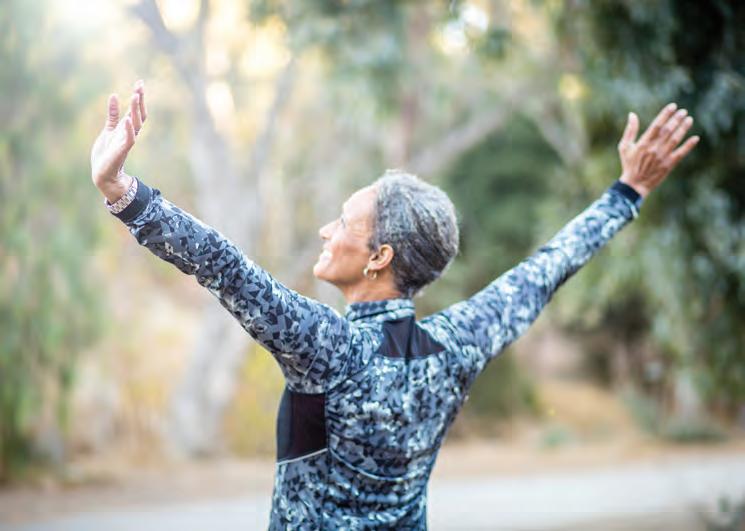
Secondary progressive multiple sclerosis (SPMS) patients appear to have slower worsening disability than people with primary
progressive MS (PPMS), a new study has found.
But, those with SPMS do tend to be generally older and their disability tends to be more advanced when their condition enters the progressive stage.
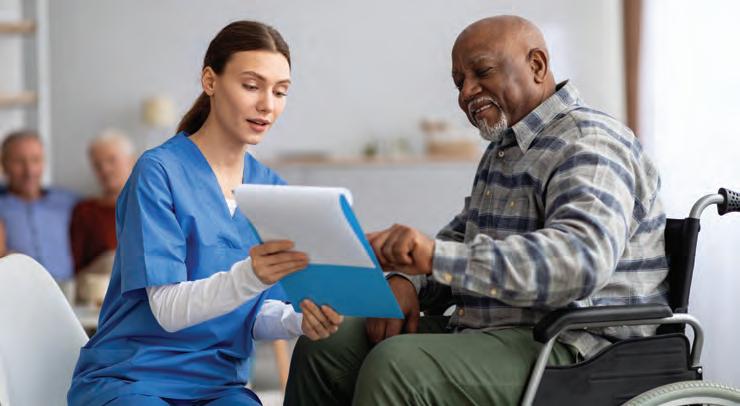
The most common type of MS is relapsing-remitting, which sees people often have
Collectively, the data suggests PPMS patients tend to accrue disability more quickly than in SPMS, but because SPMS patients usually have noteworthy disability already when they enter the progressive phase, people with either form tend to be similar ages when hitting disability milestones.
Mavenclad can offer up to 15 years of benefits
SPMS may start later and go slower than PPMS
Scientists have developed a new laboratory model using tadpoles that can help discover remyelination abilities of new therapies for MS, a new study reports. Researchers said the model would be useful to test the remyelination potential of drugs before long and costly clinical trials are launched.
All current therapies for MS reduce inflammation – finding a drug that can stimulate remyelination, which would repair the damage done to the brain and spinal cord done by MS, is something researchers are keen to do.
Early lab work often shows promise in this area, but then disappoints when tested in
humans. Researchers said this might be because therapies are investigated for their ability to promote growth of oligodendrocyte cells, which make myelin, but tests haven’t thoroughly explored whether this oligodendrocyte activity leads to better nerve function. The researchers in this study said for a drug to be effective it must be able to improve symptoms of disease.
The study used tadpoles of the African clawed frog which, when born, have transparent bodies which allowed the researchers to see the central nervous system and other internal structures of the animal without hurting it. For this model, the tadpoles were engineered so that their
oligodendrocytes would express two new proteins. Because the tadpoles are transparent, they could see exactly what was happening to the molecules they introduced, which were shown to promote remyelination, and measure the clinical benefits to the tadpoles.

“This new tool has the potential to advance our knowledge of the link between visual disorders –one of the most common symptoms of multiple sclerosis – and associated demyelination lesions,” the researchers said.

Putting medicines in lipid (fat) nanocapsules that can access the brain may allow scientists to treat inflammation and myelin loss, according to a new study.
Researchers in the cell-based study used modified nanocapsules containing retinoic acid to suppress inflammation and encourage cells that
produce myelin, called oligodendrocytes, to grow. Retonic acid comes from vitamin A and has been shown to stimulate the growth of brain cells from neural stem cells and to produce mature oligodendrocytes from oligodendrocyte progenitor cells. It can also modulate immune responses and promote regeneration in the nervous system.
It does therefore shown promise as a potential treatment
for the inflammatory response in MS and to help re-grow myelin. The compound is prone to degradation though.
“Overall, the results show that this nanosystem can act in both the inflammatory microenvironment present at the brain and spinal cord of affected patients, but also stimulate the differentiation of new oligodendrocytes, paving the way for a promising platform in the therapy of MS,” said the study’s authors.
The MS diagnosis rate has stayed constant in the UK in the last 20 years, a population-based study which involved more than 22 million people has found. Women in this study were found to be twice as likely as men to receive a diagnosis of MS.
Many autoimmune conditions were found to occur together, but MS stood out because it had less coexisting conditions, which researchers said suggests it is a distinct disease compared with other autoimmunities. Around 10 per cent of people in the UK have an autoimmune condition, according to the study’s data. More than 80 different kinds of autoimmune diseases have been described by the medical profession, ranging from conditions such as type 1 diabetes and rheumatoid arthritis to ankylosing spondylitis and lupus.
For this study, a group of specialists came together to investigate 19 common autoimmune diseases.
The study looked at health records from 22 million people in the UK, from the year 2000 to 2019. During this time, 15,634 people were newly diagnosed with MS. The median age for diagnosis was 45, with most people
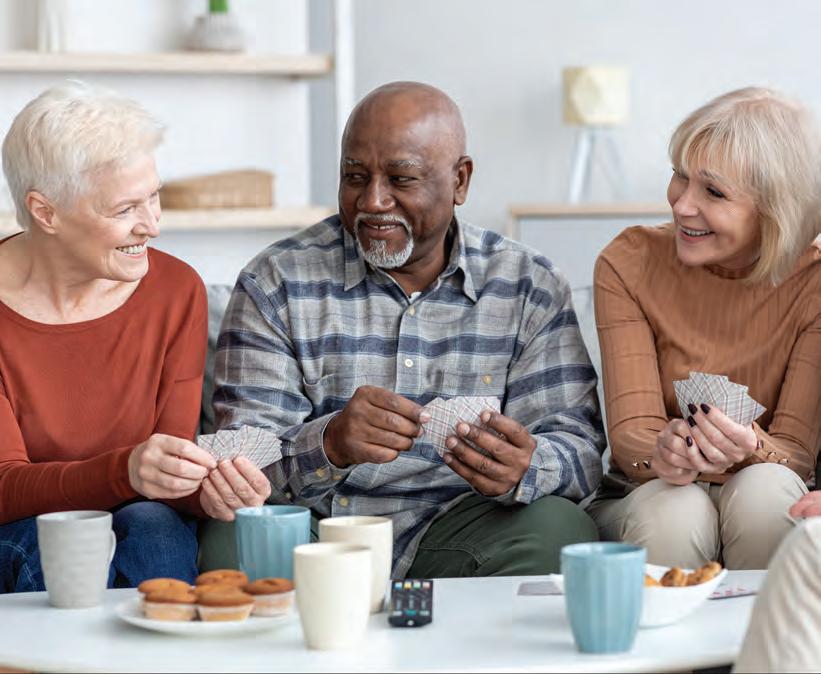
diagnosed between 36 and 56. The rate of diagnosis remained almost constant during the two decades, with an incidence of 10.4 per 100,000 person years from the year 2000 to 2002 and 10.6 between 2017 and 2019. Person years is a measurement of the amount of people in the study and the amount of time each person spent in the study –so a study of 1,000 people for a year would be said to have 1,000 person years.
Of the 19 autoimmune diseases picked for the study, 10.2 per cent of people were affected.
Across all the data, the suggestion was that a lot of autoimmune conditions occur together with the highest association being amongst conditions affecting connective tissue, in particular Sjögren’s syndrome, lupus and systemic sclerosis. Childhood-onset type 1 diabetes also co-occurred with Addison’s disease, celiac disease and thyroid diseases.
In contrast to these findings, MS had low rates of co-
occurrence with other autoimmune conditions, which suggests distinct underlying disease mechanism.
The only condition found to occur slightly more with MS was myasthenia gravis, but the link was weak. There was also a weak inverse association with some autoimmune conditions and MS, meaning people with the condition were actually less likely to be diagnosed with other diseases, though the link was only significant in vitiligo.
“Our study highlights the considerable burden that autoimmune diseases place upon individuals and the wider population,” the researchers said. “Disentangling the commonalities and differences within this large and varied set of conditions is a complex task.”
The study’s authors said there needs to be increased research to understand the underlying causes of autoimmune conditions to support the development of targeted interventions.




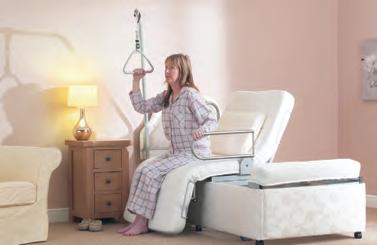
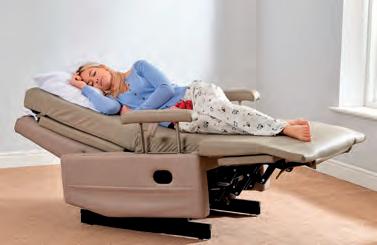










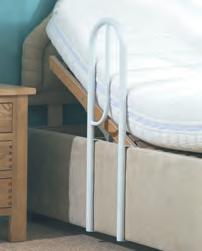


affected more than one body part, were more severe, and they didn’t go away. Given my age and symptoms I think the neurologist suspected MS.
Anyone following the debate about multiple sclerosis (MS) and viruses will be fascinated by the research highlighted in the Jan/Feb 2023 edition of New Pathways about how the COVID-19 virus can play a part in MS.
The Covid-19 virus is, of course, a respiratory virus but one with ‘neuroinvasive’ properties as anyone with long covid or even those of us who suffered a loss of sense of smell after infection with the virus will know.
Covid-19 is not the only coronavirus to have neuroinvasive properties and reading the reports of the latest research in New Pathways set me thinking about my early MS symptoms which took place in Summer 1987 when I was 29 years old.

The first time I saw a
neurologist was that year, following an unseasonal attack of a severe respiratory virus, probably a coronavirus, in August 1987. I was severely coughing and sneezing in what was a very warm summer. Everything seemed bizarre and unseasonal. While others were slapping on the suntan I was slapping on the Vicks.
The severe coughing and sneezing calmed down after a week but led quickly to paralysis of my left hand and difficulties urinating. A trip to the GP led to a referral to the hospital where the neurologist mentioned myelin. Although I had previously experienced brief episodes of double vision earlier in my 20s, the problems
I experienced aged 29 were different in the sense that they
That is where the new research paper mentioned in New Pathways comes in. It is titled, “Sequence similarity between SARS-CoV-2 nucleocapsid and multiple sclerosis-associated proteins provides insight into viral neuropathogenesis following infection”. The paper provides a potential mechanism for how Covid-19 (a coronavirus) can trigger MS-like disease or even MS in susceptible individuals.
It points out that since Covid-19 was first identified in late 2019 there have been reports of several people developing MS shortly after having the virus. While there’s not yet enough data to suggest that COVID-19 can actually cause MS, there is enough data to suggest infection with the COVID-19 virus could, in certain circumstances, ultimately lead to MS. At the end of their
How much do we really know about coronaviruses such as Covid-19 and MS, asks Ian Cook?
abstract the authors say, “Our findings substantiate the hypothesis of viral molecular mimicry in the pathogenesis of MS and warrant further experimental exploration.”
The paper, published in January 2023, is not the first to identify a link between demyelination and coronaviruses. In 2022 a paper published in the Journal of Neurology noted that, “since the declaration of COVID-19 pandemic, several case reports
of demyelination of both peripheral and central nervous systems have been published.”
Another paper, referenced in the 2022 article, was published at the start of the pandemic in the Journal ‘Viruses’ in 2019 titled, “Human Coronaviruses and Other Respiratory Viruses: Underestimated Opportunistic Pathogens of the Central Nervous System?” It noted that, “For a few decades data reported in the scientific literature has demonstrated that several respiratory viruses have neuroinvasive capacities, since they can spread from the
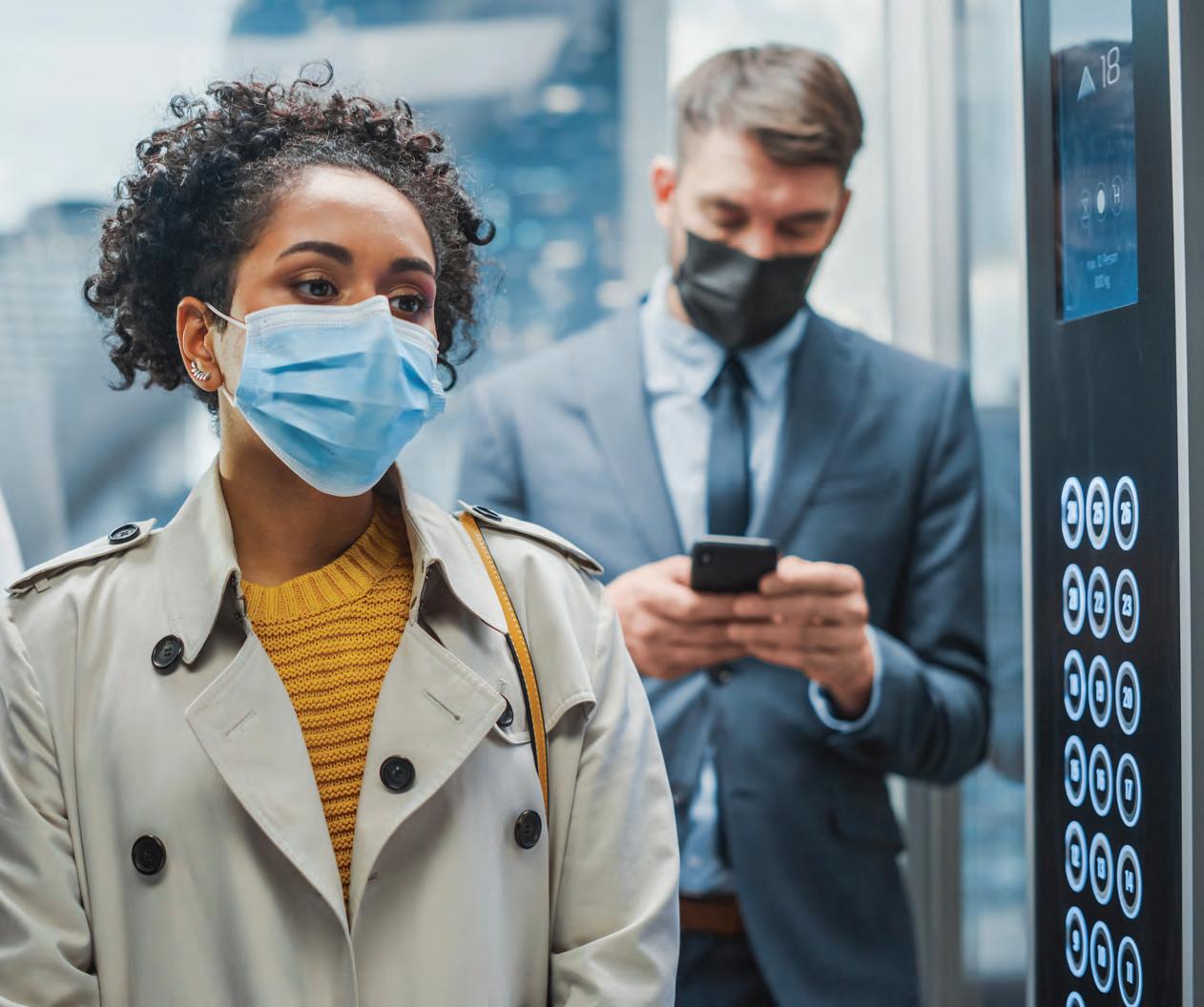
respiratory tract to the central nervous system (CNS). Viruses infecting human CNS cells could then cause different types of long-term neurological diseases.
“Like other well-recognized neuroinvasive human viruses, respiratory viruses may damage the CNS as a result of misdirected host immune responses that could be associated with autoimmunity in susceptible individuals and/ or viral replication, which directly causes damage to CNS cells (virus-induced neuropathology).”
Thinking back nearly 40 years, my episode of unseasonal severe summer respiratory infection was an almost perfect example of “virus-induced neuroimmunopathology” like that quoted in the paper published in ‘Viruses’, and my 1987 episode supports the paper’s basic claim that respiratory viruses may damage the CNS as a result of misdirected host immune responses in susceptible individuals. I would count myself as a susceptible individual as I suffered a bad EBV infection in childhood and my mother suffered an autoimmune condition (ulcerative colitis) all her adult life. So perhaps it was a respiratory virus in 1987 that played its part in me being formally diagnosed with MS a
few years later and perhaps it’s not just a severe childhood episode of glandular fever/EBV that is involved in my MS but another virus – a coronavirus.
Another paper on coronaviruses was written in 2014, five years before Covid-19, and is titled “Neuroinvasive and neurotropic human respiratory coronaviruses: potential neurovirulent agents in humans”. It says: “The scientific literature has demonstrated that Human Coronaviruses (HCoV) are neuroinvasive and neurotropic and could induce an overactivation of the immune system, in part by participating in the activation of autoreactive immune cells that could be associated with autoimmunity in susceptible individuals.
“It has also been suggested
that these recognised human respiratory pathogens could be associated with the triggering or the exacerbation of neurological diseases for which the aetiology remains unknown or poorly understood.”

Interestingly the theme for this year’s ACTRIMS (Americas Committee for Treatment and Research in Multiple Sclerosis) conference was MS: Going Viral. Several papers included the Epstein-Barr virus (EBV), and other viral infections, including COVID-19 and coronaviruses.
Perhaps a change in the direction of MS research is taking place and 2023 will be a game changer when the MS establishment starts looking seriously at viruses and other infections rather than just looking endlessly at autoimmunity. Bring it on, I say!
Our new podcast is packed with conversations, interviews and insights from experts and people living with MS - listen today!
MS-UK has launched a new podcast, Let’s Talk MS. It is hosted by seasoned journalist Ian Cook, who you’ll recognise as one of the writers in New Pathways, and who lives with secondary progressive multiple sclerosis (MS). Each episode features conversations, interviews and insights from experts and people living with MS.

Our first episode features TV’s ice man Wim Hof, who is known for putting celebrities through their paces in cold-climate challenges.
Our second episode features Tanya Clarke, a naturopath who manages her condition holistically, Yvette Sargood, a coach with MS who explains the benefits of mindfulness (including a 5-minute meditation) and a deep-dive into the possible benefits of vitamin B12.
Helping you live better with MS – listen today!
Visit ms-uk.org/lets-talk-ms-podcast-with-ms-uk Or search ‘Let’s Talk MS’ anywhere on your usual podcast provider.

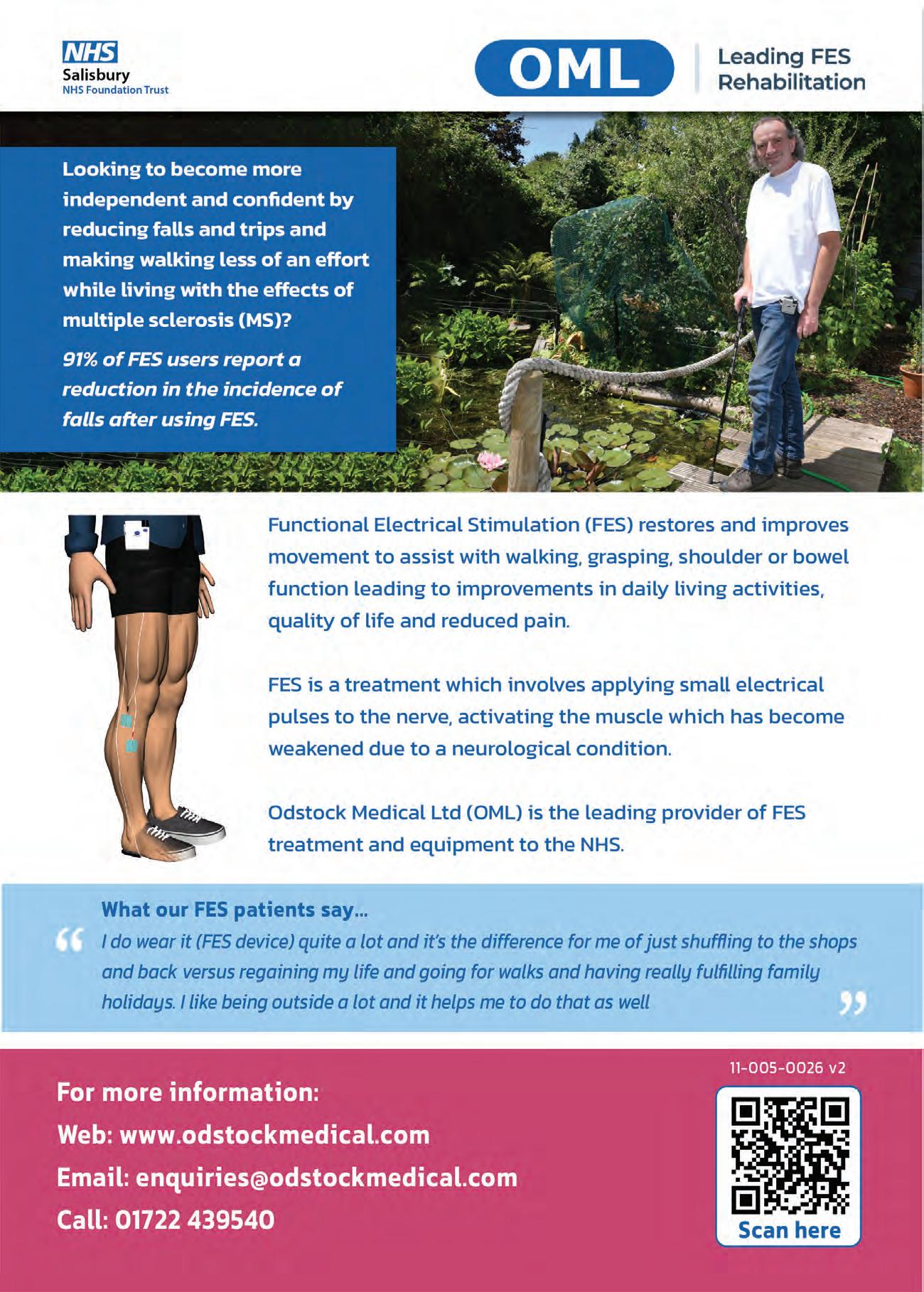
Iwas diagnosed with multiple sclerosis (MS) in 1998. I had nystagmus and my GP at the time sent me for an MRI. Back then, a neurologist should have diagnosed me using the poser criteria, but it was never used.
The first neurologist who I was
When Julia Heys’ GP wouldn’t believe her diet was affecting her symptoms, she had to take matters into her own hands

sent to read my MRI and told me it was a clinically isolated syndrome, but that I could be at risk of developing MS. He said I had a particularly benign form. I saw a second neurologist, eight months later, who decided I had MS and listed the drugs he would recommend.
I realised I had a sensitivity to gluten through a very strict diet – the Ann Boroch Candida Cure Diet which I began in early 2014. I had gone about procuring a laundry list of unfamiliar cooking ingredients for this diet, largely through desperation due to my symptoms. My walking had become more difficult. The stiffness in my legs was becoming intolerable. Add to that an all-consuming fatigue and his best mate brain fog who had just moved in, and you’ve got the beginnings of a pretty miserable life!
Initially, I cut out dairy, sugar, and gluten and then very quickly my symptoms started to abate. Within a matter of a

few weeks, the brain fog and fatigue had gone and were, as I found out, never to return. Then over the next few weeks and months, all of the symptoms I was having were getting better and better. For example, I had neuropathy in my feet – they looked deformed. The toenails were yellowing, some of my toes were twisted and gnarled, there were tiny blisters along the edges of my soles and the skin was dry and flaky, no matter how much I washed and moisturised them. The worst of the issues with my feet was that walking barefoot felt like I was standing on up-turned plugs. Then, by process of elimination and trial and error, I came to the realisation that gluten in my diet was the problem.
Consuming any of the food groups I’d cut out by mistake didn’t have any bad consequences, although if I had any gluten by mistake, my feet would feel glued to the floor, and my legs became super stiff. This would last for four or five
days, then they would return to normal again.
I must tell my GP of my findings, I thought! All will be well, and my life will return to normal. More fool me, my GP wasn’t interested at all. He wouldn’t even refer me to my neurologist to discuss it with him. I tried with my GP three or four times, but it was falling on deaf ears. So, I started my own research on the internet.
There was so much written about gluten-related disorders. One name in particular kept coming up, Professor Marios Hadjivassillou at Sheffield teaching Hospital. Sheffield is only 40 minutes away from my home. I managed to find his email address online and got in contact with him. He asked me to request an appointment with him through my GP, which I did.
I got my appointment and after a year of waiting, I had the appropriate blood tests in Sheffield, and was found to be genetically predisposed to a sensitivity to gluten. Luckily, I had stopped eating gluten a few years previously because of my own findings through my diet. An MRI at Sheffield had then shown that my ‘MS-like disease’ as they called it had apparently burnt itself out.
Professor Hadjivassillou had then advised me that gluten sensitivity can bring about an autoimmune disease. My advice to anyone would be to please
consider if anything in your diet could be making your symptoms worse, and seek blood tests to rule out sensitivities.
I currently still use a wheelchair, but I am starting to walk again at physiotherapy. I’m only at the start of my journey and getting out of this chair. My muscles are weak from using a wheelchair for three years. And, just to complicate and confuse my health issues further, I had
bilateral hip dysplasia – meaning I’ve had two hip replacements. But I now I have no MS symptoms at all, and I am about to start looking for a job working from home. I feel like I am just starting my life again!
Always discuss your diet with a health professional before eliminating any food groups
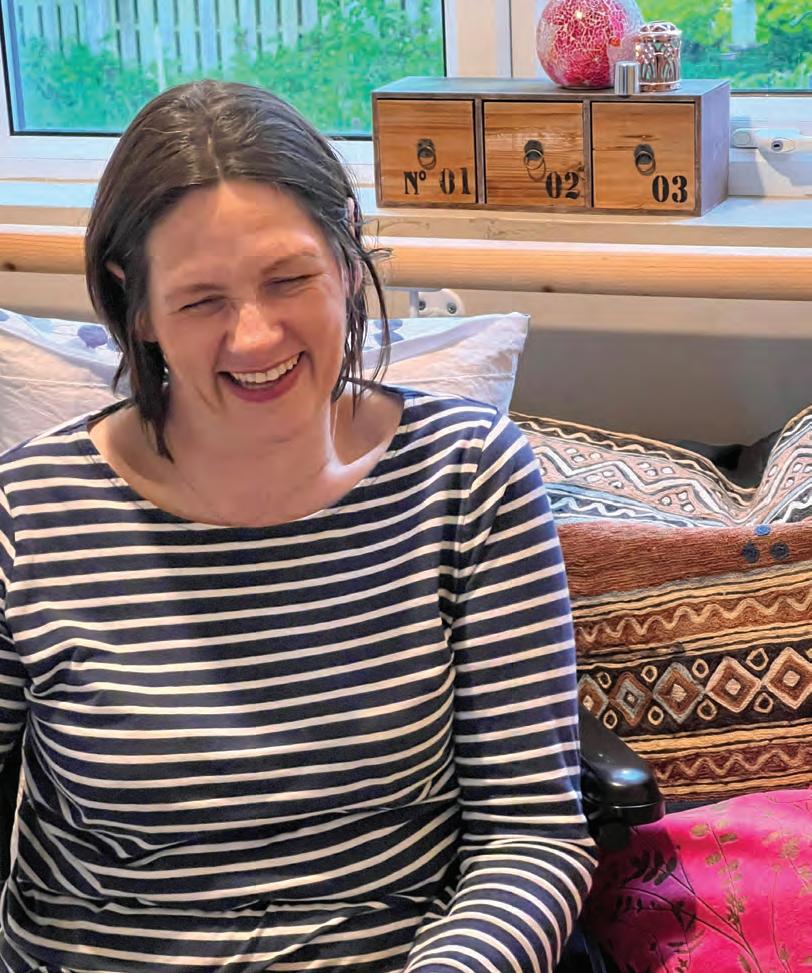

was a 2km circuit of my local velodrome once a week.
By no means was I Bradley Wiggins, but ever so slowly the kilometres began ticking away, until eventually, almost a year later I was approaching the big 100!
To commemorate the longawaited last 2km I gathered friends and family and hired out the velodrome for a celebration. Dressed in Christmas jumpers and hats I lined up on the start line on what happened to be one of the coldest mornings of the year!
100k my way!
Dear New Pathways, It was January 2022, when the frost hung around and your breath could be seen, that l decided to set myself the ‘100 km challenge any way you wish’ for charity.
I decided that I wanted to take part in a challenge where I could do as much as I was able so having a specially adapted trike I decided to tackle the challenge through cycling. The use of this trike allows me the freedom of movement powered by my own legs. My quest

Together with my supporters I cycled the last 2km in my fastest time to date, finishing with mulled wine and mince pies to warm the frozen extremities.
Through the day we managed to raise a further £150 on top of the £700 already collected, well exceeding my original expectations.
A really enjoyable challenge that stretched me both physically and mentally with a great final finish! Now to decide on the next!
Kind regards, Jackie Burden,
DevonGive us a ring!
Dear New Pathways, Frustrated at not being able to understand the latest letter we’d received about my husband’s benefits claim, I called the MS-UK Helpline (0800 783 0518) to ask if they could shed any light. The man I spoke to was so helpful and not only did he give me the information I needed, I ended up speaking for almost an hour about how I was coping since my husband’s latest relapse – we covered a lot of ground and I felt like a weight had been lifted! So thank you for running such a helpful service and I know I can call again.
Many thanks,
Kirsty Woodrow, Dorking, Surrey
Why not sign up for My MS Marathon and design your own challenge for MS-UK?
Head to ms-uk.org/ my-ms-marathon to find out more
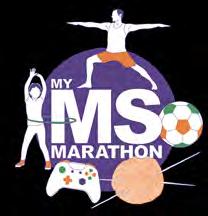




couldn’t continue at work
as a psychotherapist. Why psychotherapy? Well, had been a Samaritan in my 20s, and although that’s very different to counselling, there is a link. It’s similar in that you work with people in distress and trying to find their way through trauma. I had come through many traumatic events in my own life – loss of my mother, who lived with MS, when was seven, being diagnosed with MS


Dear New Pathways, Thanks for the article last month, When Life gives you MS, about two people who completely changed careers after MS limited their ability to fulfil their current roles. I’m at the stage where medical retirement is starting to be discussed, but I’m just not
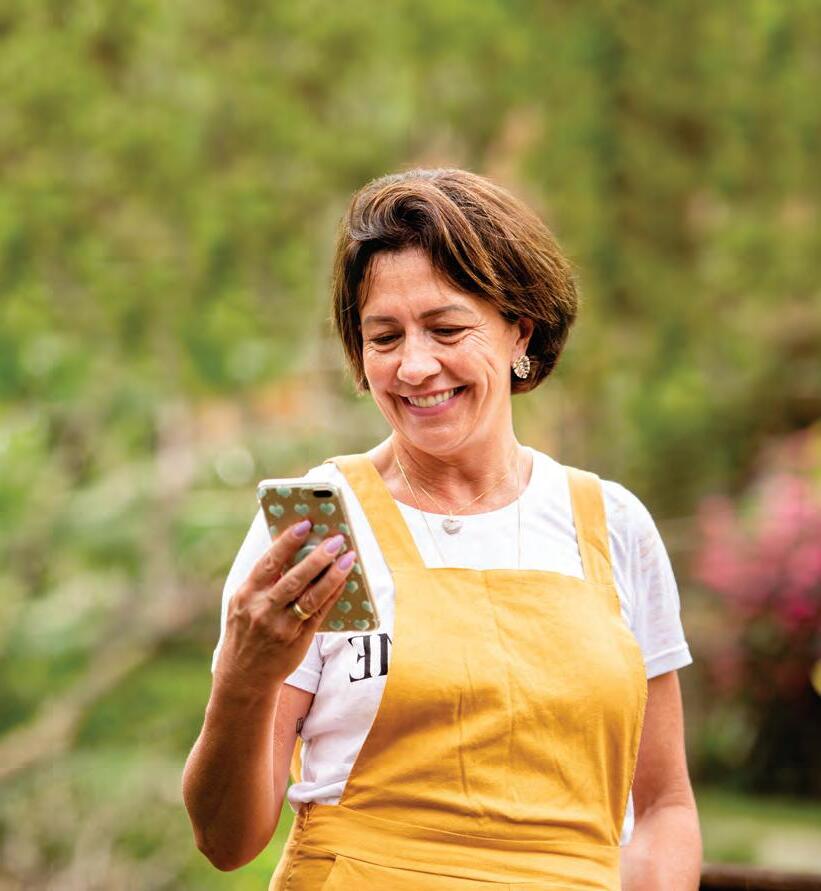
ready to never work again. This feature has given me food for thought and I’m currently researching what other options are available to me.
Thanks, Corinne Davies, Leeds

The following exercises provides a collection of movements that aim to strengthen the lower body and challenge your balance which will help improve overal mobility and walking
• Start in an upright position, looking forward, with knees slightly bent. Place one hand on your lower back and the other hand in front of your face with palm facing you
• Slowly hinge from the hip, maintaining a straight posture, until reaching a 45 degree angle
• Slowly return to the starting position
• Repeat for a total of 10 repetitions, remembering to alternate hands half way through
• Using a firm chair such as a dining chair, positon yourself towards the front edge of the seat and with feet slightly tucked behind your knees, hip width apart.
• Lean forwards from your hips until your shoulders are over your hips, driving up through your heels to a standing positon in one steady motion. Slowly return to a sitting position, controlling your decent and avoiding droping into the seat
• Repeat for a total of 5 repetitions.
• Starting with feet hip width apart, knees slightly bent and leaning forward at the hip, take a step to the side and return to the starting positon.
• Alternate bewteen left and right for a total of 10 repetitions ensuring you maintain your starting posture.
Why not check out MS-UK’s online activities? We offer a range of movement classes to suit all abilities and preferences. We’ve got everything from specialist, targeted classes to help lessen the effects of MS, through to chair yoga. Visit ms-uk. org/online-activities
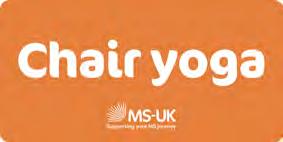


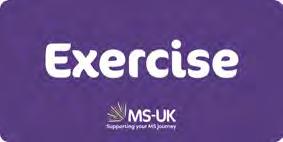
• From a standing position raise one knee to a 90 degree angle, meeting the opposing hand at the top
• Return to a starting position and repeat on the other side for a total of 10 repetitions
• Standing with feet hip-width apart, slowly shift your weight forward and come up on to your toes. Pause at the top and return to the starting position
• Repeat for a total of 5-10 times
My MS Marathon is back this July! This is your marathon. Your goal to achieve. No matter where you are, you can get involved!
Living with multiple sclerosis (MS)? Then this is the event for you. It’s simple! Choose your own challenge based around the number 26, do it in July and pledge to raise £100 for MS-UK’s helpline service.
Any of your ideas can work and we want to hear them!

Need some inspiration?


Read on below!
• 26 miles of cycling on a Therabike
• 26 swimming lengths
• 26 hours of roller skating
• 26 homemade crafts
• 26 days of no sugar
• 26 yoga moves
• 26km walking or running
Why not involve your gym or health club to set up a group challenge?
An exclusive My MS Marathon 2023 medal and certificate is up for grabs once you’ve reached your target and conquered your challenge!
In the past three years collectively, our supporters raised £30,793 for MS-UK with their own marathon challenges!
The MS-UK Helpline offers emotional support and information to those with MS. £100 could cover the cost of phone support and followup information for someone in need.
I was left feeling heard with great care and compassion at a time when I am feeling pretty alone trying to adjust to a new diagnosis



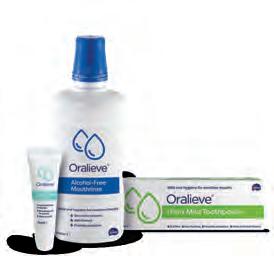






Iremember diagnosis day. It was November 2017, at 6.10pm. My phone rings, and it’s the call I’ve been dreading. “Nicola, I’m really sorry, the lumbar puncture, along with the MRI, confirms what we suspected. You do have multiple sclerosis (MS).”

Since my early 20s, I’ve always had flare-ups of pain in my neck and arm. This was treated with physiotherapy and muscle relaxants, with little effect. Intermittently, I started getting stabbing pains in my thigh. This caused intense pain.

Throughout the years different
symptoms persisted but I just carried on as best I could. During a visit to my GP with another flare-up of my neck, she was concerned to see how much I had deteriorated since my last visit. After checking my reflexes and taking a thorough history, she then said that she thought I could have MS.
Treatment began After having a consultation with the neurologist, it was decided that I should start disease-modifying drugs, the first being Tecfidera, a low-efficacy drug. I continued on this for a couple of years, however I still experienced relapses, alongside side effects from the drug.
Gilenya was then prescribed. Despite that, in November 2021, I had a severe relapse, losing power from below my waist. I spent three months in hospital receiving intensive rehabilitation.
For the past couple of
years I have been doing a lot of research into hematopoietic stem cell transplantation (HSCT). There are online forums, providing evidencebased research, alongside people’s own personal blogs on their journeys.
I decided I would be really interested in having this procedure. However, I did not take into account that my neurologist would be so set against this! He warned against the procedure - he really wasn’t a fan and he even told me there was a possibility I might come back in a body bag!
I was troubled by his conflicted attitude, which did not seem to be evidenced-based –it was merely his own personal
feelings about a treatment which was proven to have helped others.
It was then, following lots of research, I found out about the StarMS trial. Their aim was to recruit 198 participants from 19 sites. They would be using randomisation to compare high efficacy diseasemodifying drugs to autologous haematopoietic stem cell transplantation (aHSCT), to gather evidence about its effectiveness. You can find out more about this at sheffield. ac.uk/scharr/research/centres/ ctru/starms
The trial still needs people with MS to join. If your
neurologist won’t refer you, GPs can.
If they do not get the participants, then the trial may fail. This would be devastating as it’s the only way to prove the effectiveness both for the participant, and the financial viability for the NHS.
I received a referral to the Royal London Hospital. After a year I underwent numerous physical, medical and cognitive tests, as well as an MRI that would be recorded as my baseline observation. Following this I was then randomised into the trial – I’d either get the procedure or the diseasemodifying drugs.
I was really disappointed when I got the news. I had been randomised to the diseasemodifying drug arm of the trial. I was the second person at the Royal London Hospital on the trial, and the first person received HSCT.
It was decided that I would commence Alemtuzemab as my treatment drug. This medication costs the NHS £56,360 per person. It involves five consecutive days of intravenous infusions followed by a subsequent dose 12 months later over the course of three days.
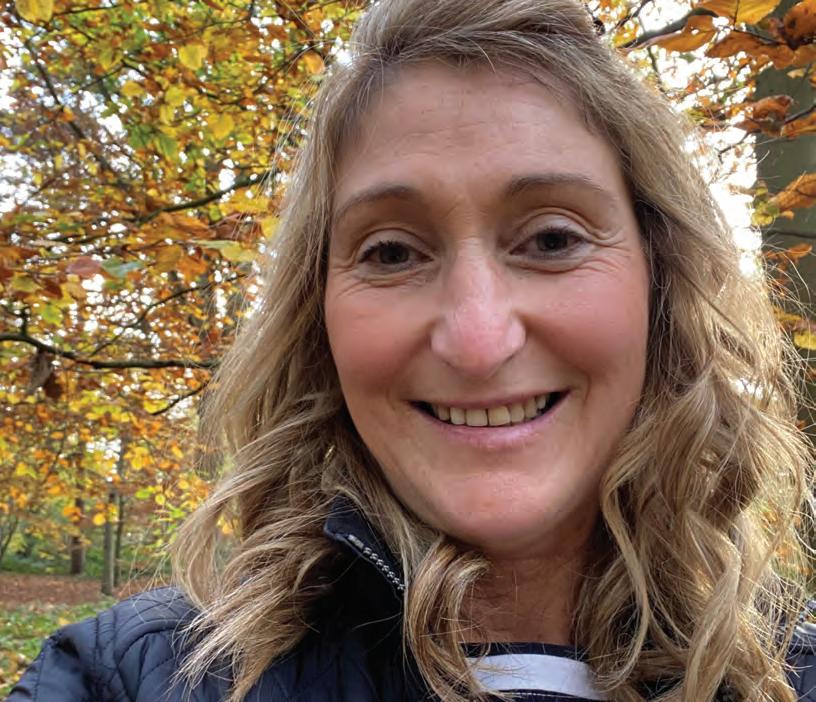
On my first day of treatment, I was a little apprehensive, however the staff were so reassuring, explaining the process, in addition to
answering my questions. They were great. Unfortunately, on my way back to the hospital hostel, I had a bad fall, and ended up in resus with a severe head injury!
My main concern was not being allowed to continue with the treatment. However, after discussing with the consultant, it was agreed that I would be admitted for the week, allowing the treatment to go as planned.
The only side effect following the treatment was breathlessness. Following a visit three months later to the consultant, I was feeling quite optimistic.
However, that was short lived. In April my children found me suddenly very unwell and barely conscious. An ambulance blue-lighted me to hospital, straight into resus.
I do not have any recollection of this. Apparently, I was vomiting blood, as well as having weakness to my left side. Initially, the doctors suspected that I’d had a stroke. However, this was soon ruled out. I received a diagnosis of a clinical relapse. I was treated with a week of IV steroids, antibiotics, antacids and oxygen. On returning home I felt quite deflated, having relapsed so quickly following the Alemtuzemab.
There is so much more I want to do with my life – with my children and my partner Gary. I am worried I will continue to relapse, thus becoming completely reliant on others.
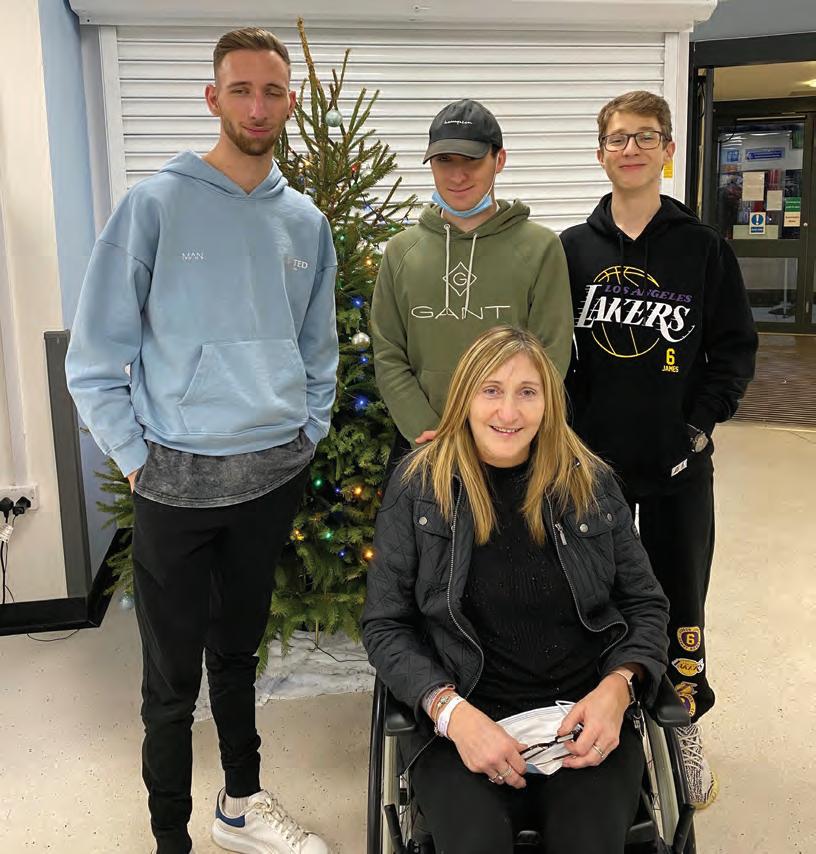
My HSCT hope
I feel that my only hope now is to have HSCT. However, I still don’t qualify on the NHS. Therefore, my only option is to go to a clinic in Mexico. Mexico and Russia are the two main places people go to for this treatment abroad. The main reason is the cost. It will be around £46,000 to have the treatment in Mexico, compared with a cost of around £90,000 privately on the NHS here. People have to remortgage, use inheritance or fundraise to be able to undergo this. My only option is to fundraise.
This was such a difficult decision for me. The thought of having to ask for donations is not in my nature. However, this is my only option to try and halt progression.
I don’t know how long it will take, or even if I will raise the funds. Nonetheless, I’m going to work as hard as I can to try and make this happen to get the old Nicola back.
After 30 years of nursing, MS took away my career. I will not allow it to take away my life!
Find Nicola’s fundraising page at gofund.me/fd467a1c.
MS-UK’s Peer Pods are groups that are open to anyone living with multiple sclerosis (MS). There are regular Zoom sessions to share experiences, provide support and encouragement, and just to socialise in general in a safe space.
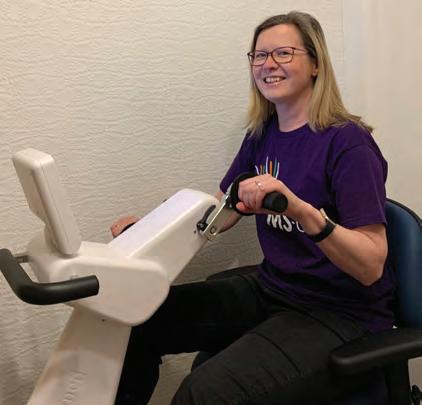
'I was diagnosed with multiple sclerosis (MS) in 1997 when I was 23 years old. For over 10 years I didn’t talk to anyone about it. My family and close friends knew I had it, but when asked, ‘How are you feeling? How’s the MS?’, I brushed it off, put a brave face on it, and made a joke.
'I lived in denial for a long time, and I was able to because the only symptoms I really had were
sensory, and thus mainly invisible. Then in 2011, I had a big relapse and my MS suddenly became much more visible to everyone. My drop-foot became permanent, and my fatigue was noticeable.
'Fast-forward to 2020 and the pandemic. Everybody was feeling isolated. Add to that the loneliness of dealing with MS and it made for a difficult time.
'Luckily for me, I was on the mailing list for MS-UK. I had an email about their new peer pods and I decided to join the Media pod (like everyone, I was watching a lot of TV at the time).
'The experience of talking with a group of people who understood completely the mobility challenges, the tingling, the fatigue, the bladder issues, and whatever else, was absolutely
liberating. And they were lovely and friendly too!
'Suddenly, I was not at all alone with my MS. I soon joined almost all the peer pods, saw the same people at some, and met different people at others. I was fortunate to meet two people in person and with both it felt like we’d known each other for ages!
'I have definitely gained a whole new group of close friends. So much so that I now host the Thursday evening Women’s pod which is such a supportive group.'
I have definitely gained a whole new group of close friends
Caroline Gray has made friends that she can share her MS experience with in a way she couldn’t with people unaffected by the condition
'I was diagnosed with MS in 1991 in my early 30s. My mother developed MS just after I was born. There was no treatment in the 60s and she died seven years later, which is very rare. Her sister also had MS but lived until she was 83.
'As my experience had been quite traumatic as a child, I was very reluctant to willingly engage with anyone who had MS. There was no medication to discuss, and neurology services could not provide any guidance. I did reach out to the MS Society but that very positive experience. In 2015 however I was at last eligible for a DMT and began to interact with other MS people on twitter who were also taking it.
'Five years later we were all locked down in fear of another more potentially fatal illness and one which may have unknown consequences for those with MS and other conditions. Scrolling through MS information I came across MS-UK and enrolled in their online exercise and yoga classes and before long became involved in the new Monday Media pod. We were all watching so much TV at that time that a group met online to share films and TV ideas. This soon developed and before long we were talking about our MS and sharing information and experiences.
'After that other groups naturally began to emerge and weekly
online chats became a lifeline for many to talk about our struggles with the illness, our varying experiences of the NHS provision, medication, equipment and life in general. Women’s group, men’s group, online dropin sessions, a book group, newly diagnosed group and more sprang up and I host the Friday women’s group. Lively WhatsApp groups provide continual support about all things MS and all things non-MS.
'For many years I didn’t interact with anyone else with MS. Then in lockdown, I came across MS-UK and enrolled in some yoga and exercise sessions.
'I have gained so much from the peer pods. Information, emotional support, and understanding from those who totally empathise about living with this lifelong condition. I have made friends

with many and have told them things about my experience with MS that I could never tell others who were not affected. It can feel daunting to join in, but new faces and experiences are really welcome and valuable. There is no pressure to even to join in the chat. It may be enough to just listen at first. This is such a wonderful resource for us, and I encourage anyone to give it a try.'
If you would like to be part of the Peer Support service and get involved with one of our Peer Pods, please contact our Peer Support coordinator Vicky who can let you know more about the service. Please email peersupport@ms-uk.org.
I have gained so much from the peer pods – information, emotional support, and understanding
When Hans Christian Andersen wrote the Snow Queen in 1844, he probably never thought his fairy story would be performed as a dance. What is even less likely is that he thought three wheelchair dancers would play the parts of Kai, Gerda and the eponymous queen. However, 180 years after the Snow Queen was written, an innovative dance featuring three wheelchair users has just toured Midlands theatres performing a wheelchair dance based on the fairy story to critical acclaim. One of the dancers is MSer Rebecca Fowler, a 39-year-old mother of two who lives in Redditch, Worcestershire.

Rebecca was diagnosed with multiple sclerosis (MS) MS in 2006, aged 22. Her first symptoms came years earlier and involved a mixture of numbness and pins and needles from her chest down.
At the time, Rebecca was also experiencing weakness in her legs and was struggling with her knees giving way as well as getting up and down stairs. Scans showed an area of spinal cord inflammation which was managed with steroids. Another scan in 2006 showed lesions in her brain which led to her diagnosis.
An MS diagnosis, as we all know, brings with it a heavy emotional load and Rebecca admits that she has struggled with depression and mental health issues. But self-help is often the best help and Rebecca actively looked for a new direction for her new life as an MSer. And 10 years after diagnosis, having negotiated a difficult decade, Rebecca discovered wheelchair dancing.
“I started learning to dance in 2017 aged 33. Following a deterioration in my health after the birth of my daughter I was
coming to the end of a period of rehab and was looking for a way to keep active independently,” she says.
“I use a wheelchair in my day-to-day life so I was looking for something I could do as a wheelchair user. I found a wheelchair dance group called Freewheelin in nearby Birmingham and decided to go along and try it out.”
Freewheelin is a community group mainly aimed at people with a disability and the majority are wheelchair users. The shared connection of being disabled and/or chronically ill means members
have a lot in common and Rebecca says she has made a lot of very good friends from being part of the group.
“In the group we all have different disabilities and different ranges of movements, but we are able to adapt the choreography to suit our bodies and what works for us which makes it such a flexible and inclusive way to keep active. I think ultimately as long as you’re having fun and enjoy moving to the music it really doesn’t matter how you move.”

Rebecca decided to take her dance a stage further and joined a group called Propel Dance, a new all-wheelchair user professional dance
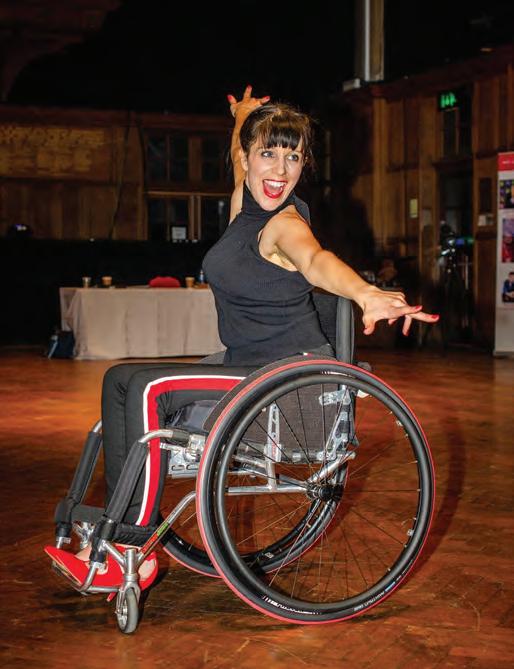

company based in Birmingham which has just secured investment from Arts Council England to pilot a short tour of three theatres in the Midlands with a contemporary reimagining of ‘The Snow Queen’.


Propel Dance’s Artistic Director Helen Mason says, “We care deeply about equity and equality of opportunity. It’s why we exist. There are few professional opportunities for wheelchair dancers, and we wanted to be that change, to create something that enables progression and inspiration to
the future generations.”
After the Snow Queen, the future for Propel Dance will depend on being able to secure further funding to hopefully be able to develop the show further to a bigger tour around the UK. But for Rebecca there are several other dance projects she continues to be involved with and she has a rapidly growing list of credits for her dance work outside of Propel Dance.
In 2022, Rebecca took part in Wondrous Stories, the opening of the cultural festival for the Birmingham 2022 Commonwealth Games,
something she describes as a “wonderful experience.”
Looking to the future
Rebecca says her long term goals for dance are to enjoy herself with whatever she’s doing. “Whilst I’m very driven and enjoy a challenge, I tend not to set myself too many goals as ultimately, I just want to enjoy what I’m doing and will follow opportunities that I think sound fun. My life goals are to keep as active as possible for as long as possible and to do the very best I can with what I have.
“First and foremost, I love dancing. I don’t think I would have got into dance without my disability and certainly wouldn’t have considered being in a show like the Snow Queen, so feel this has been an unexpected opportunity to have come from it.”
Although no-one can deny that MS limits opportunities particularly for those diagnosed in early adulthood, Rebecca and her story is an inspiration. It shows that while MS closes many doors for us with MS, it can and does open others if only you seek them out - which Rebecca has done with great style and imagination.
• Employers often don’t understand MS and what it entails so we may need to explain the impact. Be clear on what MS means for you and how that impacts your role. Write this down

Studies show that people with multiple sclerosis (MS) have higher rates of mental health challenges, such as depression and anxiety, than the general population. As we navigate the ups and downs of living with MS and the impact that has on our dayto-day life and therefore work, it is not surprising that we might face challenges.
It is important to know that, in terms of the workplace, mental health and MS can be interwoven. Employers may mistakenly consider MS to be a physical disability without considering the mental implications of living with the condition. Whilst you may be physically able to navigate work, you may need additional support to navigate the impact on your mental health.
If this is sounding familiar then there are things you can do to support yourself and to advocate for the right support in your workplace
• Think about what you need in terms of support specifically linked to mental health. Think about what aspects of your role are particularly triggering and what could help with that. Meet with your employer to discuss and agree any adjustments
• Request a referral to occupational health. This can be an invaluable support in terms of having someone alongside you to advocate for your needs
• Provide written materials to support the conversation. MS-UK have a range of tools you can point your employer to including free training. Visit ms-uk.org/training
• Take time out when you need to. Your mental health is really important. You’re better taking time to recover than forcing work. Ensure that when this is linked to your MS, you state that clearly, so it is recorded as such. This helps to build understanding of how the two link and affords you protection from discrimination under The Equality Act 2010
• The MS-UK website has a range of resources linked to self-care and support. Why not join us for some yoga or mindfulness? Visit ms-uk.org
Serves 2

Aubergine steaks
• 1 aubergine
• Salt
Glaze (for one aubergine –double up if necessary)
• 1 tsp red miso
• 1 tsp syrup (eg agave or maple)
• 2 tsp mirin (rice wine)
• 1 tsp soy sauce (use Tamari if GF)
• 2 tsp toasted sesame oil
Optional serving suggestions –sweet potato wedges, tofu
skewers, brown rice or other grains, green salad
1 Slice each aubergine into circular steaks, about 2cm thick. You can also slice them lengthways but make sure they are flat to aid thorough cooking.
2 Sprinkle the aubergine slices with a little salt, on both sides, then leave to sit while you prep the other ingredients.
3 Mix up the glaze until fully combined and set aside. Prepare any optional side dishes now.
4 With a sharp knife, make slight
criss-cross patterns across each side of the aubergine steaks.
5 Brush the glaze generously over both sides of each steak, leaving a little to brush on just before serving.
6 Place on a red-hot BBQ or well-oiled griddle for a few minutes per side. Aim to caramelise the steak without burning it. You want the aubergine to soften without being too mushy.
7 Once softened and nicely charred, brush the aubergine steaks with the remaining glaze. Add chilli flakes and fresh parsley if desired.

Ingredients
Roasted broccoli
• Half a head of broccoli, broken into florets
• 1 tsp cumin seeds
• 1 tbsp olive oil
Quinoa
• 100g (uncooked) quinoa, rinsed and cooked according to the instructions on the packet
Butternut squash
• 400g/2 cups butternut squash, cubed
• 1 tsp paprika
• 1 tsp olive oil
Tofu
• 150g firm tofu, drained and patted down with kitchen roll or a tea towel
• 1 tbsp soy sauce
• 1 tbsp rose harissa paste
Veg/Salad
• Use veg/salad of your choice eg avocado, cucumber, lettuce, tomatoes, grated red cabbage, pomegranate seeds
Tahini dressing
• 2 tbsp tahini
• 2 tbsp lemon juice (fresh or bottled)
• 2 tbsp olive oil
• 2 tbsp water
• Pinch salt
Method
Roasted broccoli
1 Preheat the oven to 180°C/ 350°F/Gas Mark 4.
2 Drizzle with some olive oil and the
cumin seeds and make sure it’s fully coated.
3 Bake for around 20 minutes or until the florets are lightly golden.
Butternut squash
1 Drizzle the cubes with olive oil and paprika and make sure it’s fully coated.
2 Bake for around 30 minutes or until soft and golden, turning once.
Tofu
1 While the vegetables are
roasting, lightly fry the tofu cubes in a little oil until golden. Add the soy sauce and rose harissa. Taste and add a little salt if necessary.
Tahini sauce
1 Mix all the ingredients thoroughly in a mug.
Assembly
1 In two wide shallow bowls, arrange all of the different ingredients into sections then drizzle with the tahini sauce.
QMy wife has MS and she has been using colostrum capsules. Is colostrum recognised within the MS community as a way to maintain mobility? My wife swears it helps. Why isn’t it available on the NHS?
AThere are many health benefit claims for bovine colostrum, but unfortunately there is limited strong evidence to show those benefits specific to MS. Bovine colostrum is the first milk produced after a calf’s birth and is a rich natural source of nutrients, immunoglobulins, and peptides with anti-microbial activity and growth factors.
The evidence that would be needed to get the full backing of the MS clinicians is not good enough for colostrum to be suggested as a treatment. Colostrum products are not marketed as a medicine, but as a supplement or ‘nutraceutical’ (a hybrid word from ‘nutrition’ and pharmaceutical’).


There was a small trial using colostrum in the 1980s with people with MS which although was largely found to be safe and well tolerated, reported limited success. More recently, in 2016
a case report was published by Japanese researchers about an Australian man with secondary progressive MS who was given a therapeutic dose of Gc protein-derived macrophageactivating factor (Gc MAF). Gc MAF is derived from bovine colostrum. In this case, positive results were observed. This was a single case study and we weren’t able to find any follow up studies.
There is some evidence that bovine colostrum can potentially help with immunity, fight infection, and promote good gut health. These are all aspects that are important for the wellness of someone with MS.
Long time readers may remember that Ian Cook wrote a piece titled ‘the colostrum effect’ in issue 123 back in 2020. In that piece Ian had been using the supplement for a week without noticing any differences to his MS but was willing to continue purchasing the tablets. Helpline reached out to Ian. He had this to say –“I did try bovine colostrum a few years ago, which I bought from Ig Bioscience online at www.igbioscience.co.uk. Liz Rostand, the founder of Ig
Bioscience has MS and reported that taking colostrum had changed her life for the better. It sounded as though it was worth taking so I ordered colostrum tablets and took them for about a month. All I can say is that taking colostrum didn’t have sufficient positive effects for me to re-order. Arguably I should have taken it for longer to see positive effects.”

QI am in receipt of personal independence payment (PIP) and recently went for an eye test. I thought it would be free because I’m on PIP but that wasn’t the case! Are there any other benefits I can apply for that will cover the cost?
AUnfortunately PIP does not cover the cost of eye tests. PIP is a disability-related benefit, rather than an earnings replacement benefit. Meaning, the benefit is given based purely on how your health condition affects you, rather than based on any income or savings.
Knowing what benefits you can apply for can be confusing. MS-UK have a dedicated webpage explaining the different benefits at ms-uk.org/ benefits-and-ms
With regards to benefits that entitle you to a free eye test, you must be in receipt of one of the following
• Income support
• Income-related Employment and Support Allowance
• Income-based Jobseekers Allowance
• Pension Credit Guarantee Credit
• Receiving universal credit and you have no earnings or your (and your partner’s) monthly earnings are no more than £435, or £935 if your award includes the child amount or you (or your partner) have a limited capability for work
• Claiming child tax credit or working tax credit and are named on a valid NHS tax credit exemption certificate
You are also entitled to free eye tests if you have a valid HC2 certificate (full help with health costs) under the low income
If you’ve got questions about multiple sclerosis, you can call and speak to Laura, Ryan or Shaun for free by calling 0800 783 0518, Monday-Friday, 10am-4pm.

You can also get in touch by emailing info@ms-uk.org or visiting ms-uk.org/helpline
scheme. An HC3 form will help with partial costs.
It may be useful for you to use a benefits calculator to see if you may be eligible for other benefits that you are not currently in receipt of. They are free to use and are anonymous. Have a look at our website. ms-uk.org/ benefits-calculators
If you become eligible for one of the above listed benefits and therefore entitled to a free eye test, your optician will require you to fill in a specific form and show them proof of eligibility. A letter stating you have been awarded the benefit will suffice.
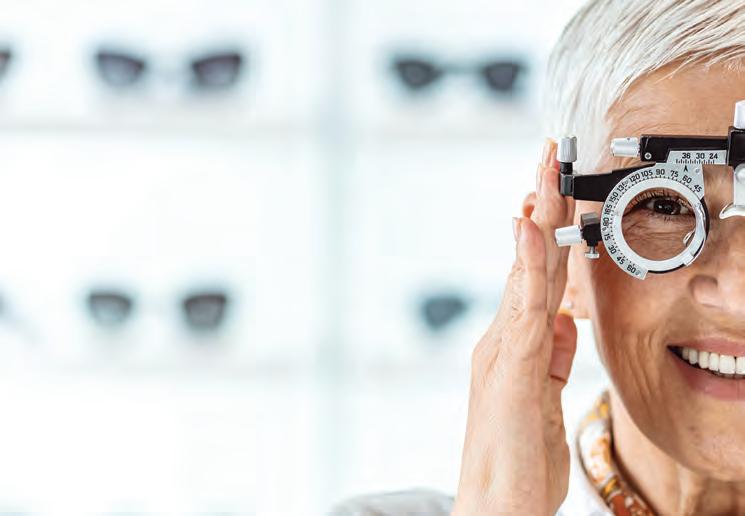
Help us make your magazine even better by giving us your opinions
How old are you? Under
75+
Prefer not to say
How long have you been a New Pathways reader?
Less than a year
More than a year
More than five years
More than 10 years
Why do you read New Pathways?
What would you like to see more of in the magazine?
Do you like the way the magazine looks and the design of its pages? Please give reasons
Is there anything you would prefer not to see in the magazine?
Do you feel that New Pathways improves your understanding of MS? Please let us know the reasons behind your answer
MS-UK wants a world where people affected by MS live healthier and happier lives. Do you think New Pathways helps you do this? Please let us know the reasons behind your answer

Would you like to be able to spread the cost of your subscription to New Pathways magazine and pay monthly?
I would like to be entered into a draw to win a £25 Amazon Voucher
Name
Address
Phone
Please return your completed survey to MS-UK by 30 June 2023. Send it to FREEPOST MS-UK (no stamp is required)
All the information you provide in this survey will be kept anonymous unless we contact you as our winner of the Amazon voucher. Your information will be kept in accordance with our privacy policy and we will never share your information with any third parties. Visit www.ms-uk.org/our-policies/ to read our privacy policy.
Clients often talk about the worries they have around their multiple sclerosis (MS) diagnosis.
It can be easy for these worries to spiral – for example if the initial worry is ‘my symptoms are not improving,’ this may lead into a spiral of ‘what ifs’ around the future. Some of these ‘what ifs’ may be upsetting, especially if these include thoughts around how your condition could progress.
One way to manage this is to set aside a time during the day when you can focus on what it is that is worrying you. It might be helpful to write a list so that you can look at and explore each worry to see which ones

you are able to do something about. It does not have to be the case that you work through all your worries in one go, but instead focus on the ones that you really need to address right now. Physically seeing that you are working through your worries may help you to feel more positive. Then there are the worries that may be around the ‘what if’s’ of the future – with these worries it may be helpful to talk these through with someone, perhaps a counsellor to help you process your feelings and emotions around these.
Setting aside this time to worry can be particularly helpful at night-time. During the day your
mind may be focused on other things. But without other distractions these worries may come to the forefront of your mind. It can be helpful at this point to ask yourself if what you are worrying about can wait until the next day for you to work through? And if so, to remind yourself of this each time the worry appears, and that right now what is important is for you is to get some sleep. It may be helpful to practise some mindfulness and relaxation exercises.
You can also plan a time when you’ll focus on this worry so you’re able to sleep knowing that you have set this aside. This kind of self-talk may take time to stop you from focusing on your worries at night-time, especially if you have been doing this for a long time – but the more you practise this, the easier it’ll become.




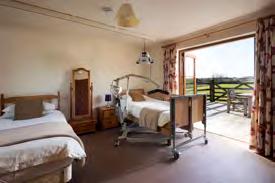







Since we launched our online activities in 2021, we have steadily grown what we offer online, supporting more and more people affected by multiple sclerosis (MS) with every session.
We have been busy developing a new online portal that is now available to join at ms-uk.org/login
Joining is easy and you have three options that include a
pay-per-session, monthly or annual subscription.
Once you are registered, you can visit our ‘Events’ section where you will find all the upcoming live classes that include our weekly exercise and chair yoga classes, monthly info sessions and workshops that include a range of topics from symptom management, Personal Independent Payment (PIP), and
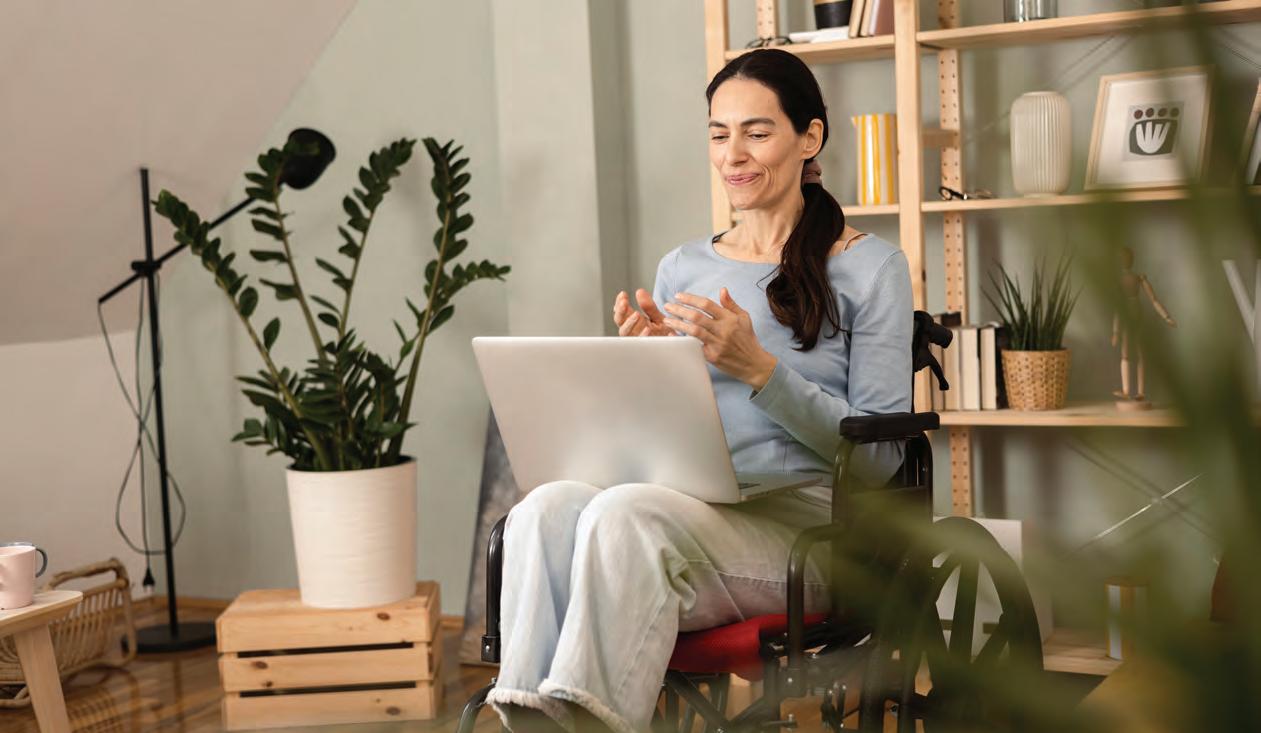
diet, to walking and creative writing sessions.
Live classes are accessible from your personal account once you’re registered to the portal. You’ll be taken to a live Zoom class, plus have the option to watch recordings for all our classes if you are unable to make the session or would like to watch it again. With this new feature, we have created ‘on demand’ content that can be viewed anytime at your convenience.
We also have links to downloadable worksheets that you can view and print off that cover a range of exercise topics including improving balance, strength, yoga and hand reflexology. As the portal develops, we are aiming to add further resources that are accessible and cover a range of information to help mange the effects of MS. To find out more, visit the online activities page ms-uk.org/online-activities
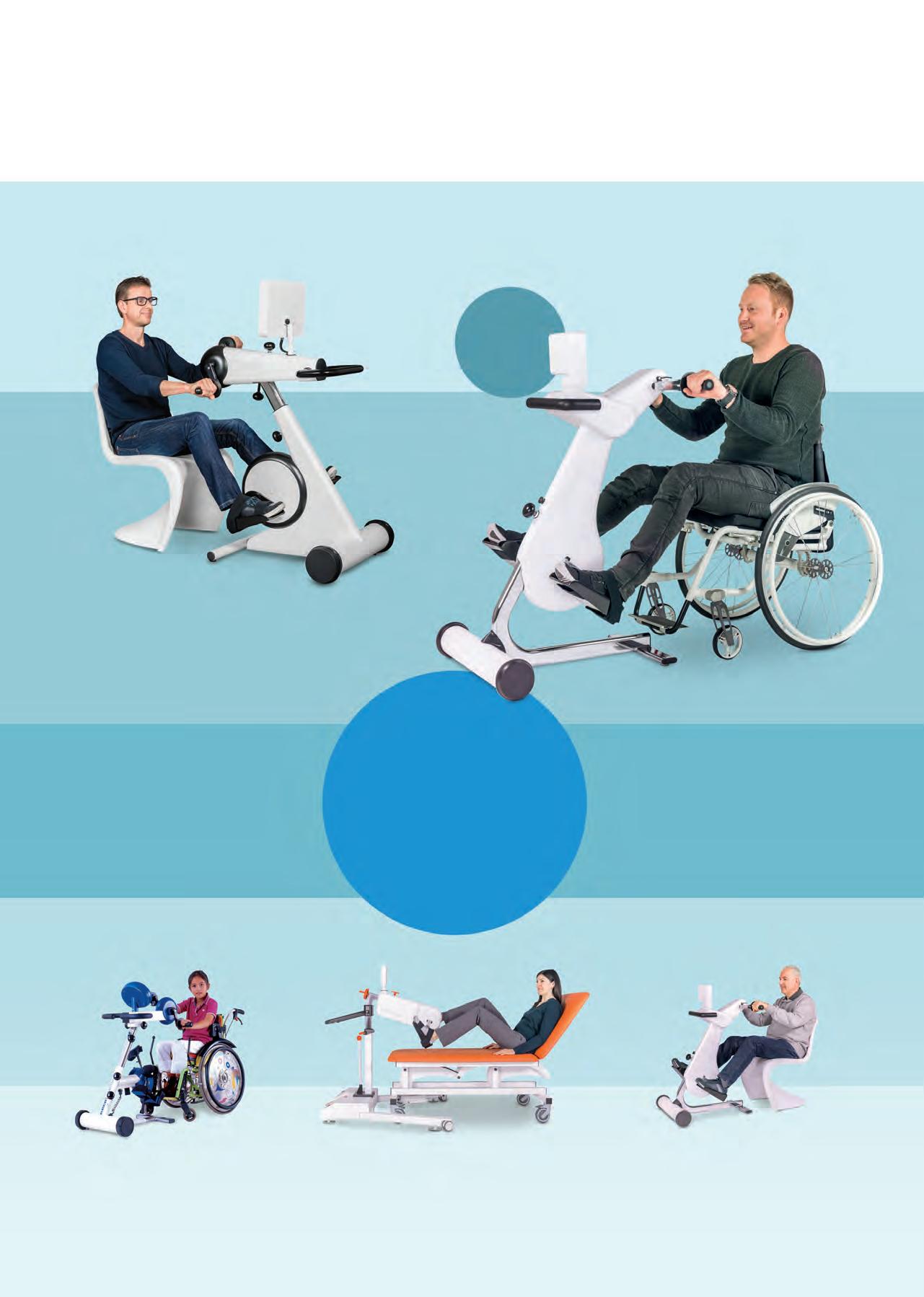
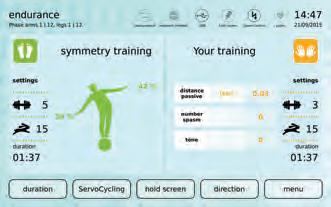



Unique
•Available in 9 sizes, from 18mm-35mm (Ø)
•Available in 11 sizes, from 18mm-40mm (Ø)
•Shorter length – 75mm
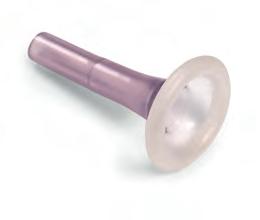
• Shorter
•Stronger adhesive
•Longer length – 130mm



















• Large
• Buffer/comfort zone to
•Buffer/comfort zone to prevent backflow and sheaths blowing off
•Latex-FREE
9 sizes
•Large buffer/comfort zone to prevent backflow and sheaths blowing off
•Latex-FREE
• Customise/remove
•Customise/remove excess length (scissors provided)
• Perfect
•Perfect fit/size for all
11 sizes
•Specifically designed for wheelchair users
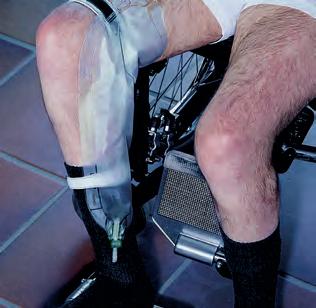
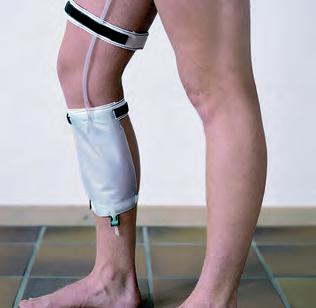
•700ml and 1300ml sizes
•Shaped to the contours of the bended knee






•Traditionally shaped leg bag
•600ml and 1000ml sizes
•7cm shorter in length than many 750ml bags – no unsightly taps dangling
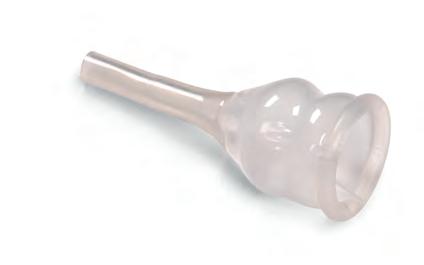
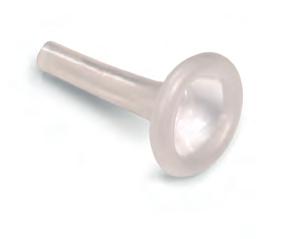
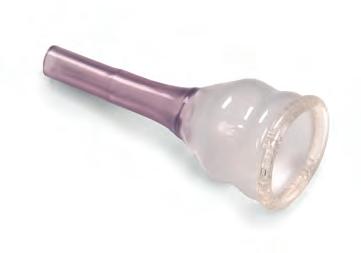
•Ideal for sun, sports, and even some short clothing
•500ml capacity
•Dress as YOU want, not to cover the leg bag
For more information, please contact the helpline on: 01604 595 696 quoting NP/M/J helpline@manfred-sauer.co.uk
Or visit: www.manfred-sauer.co.uk